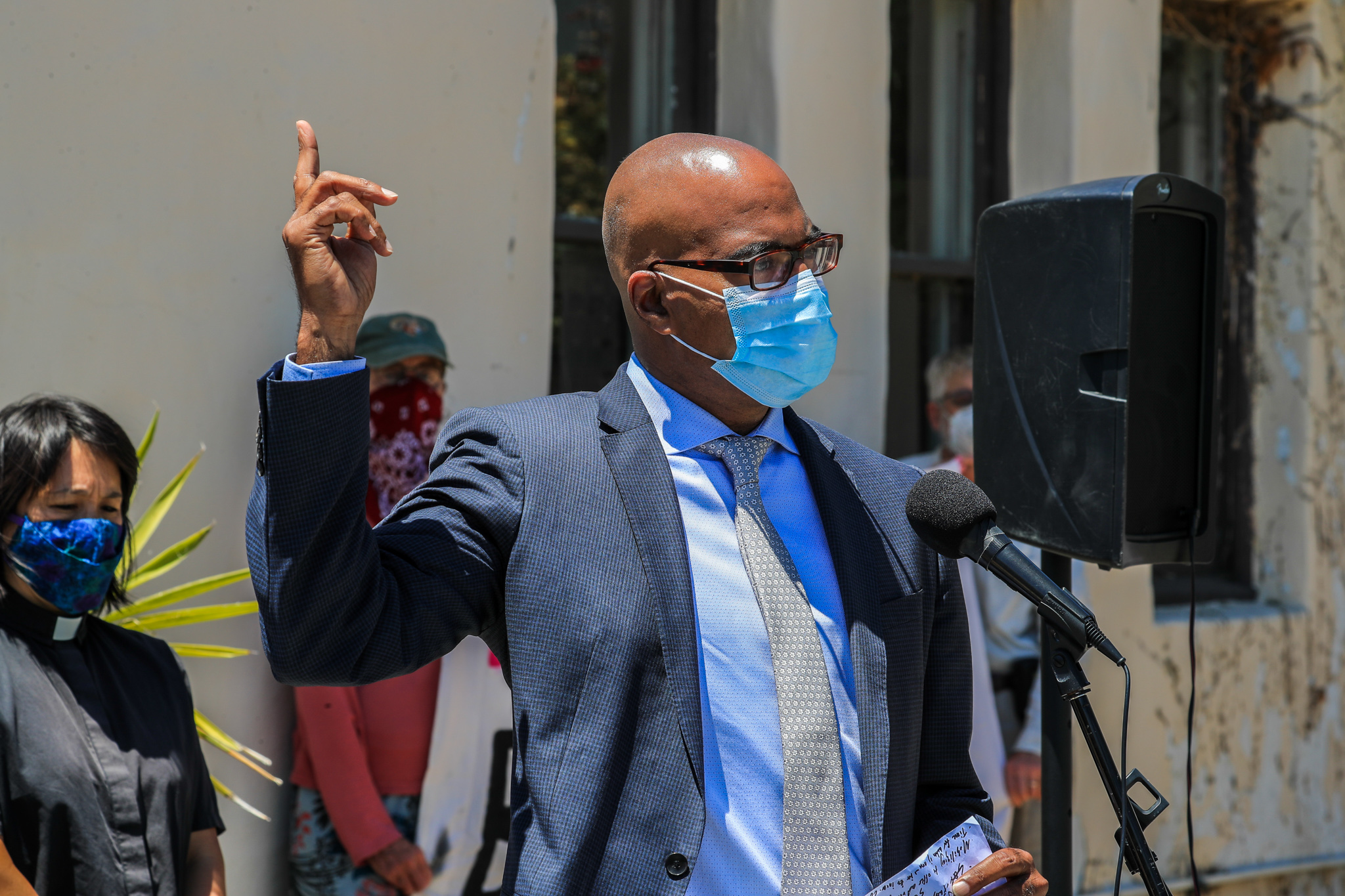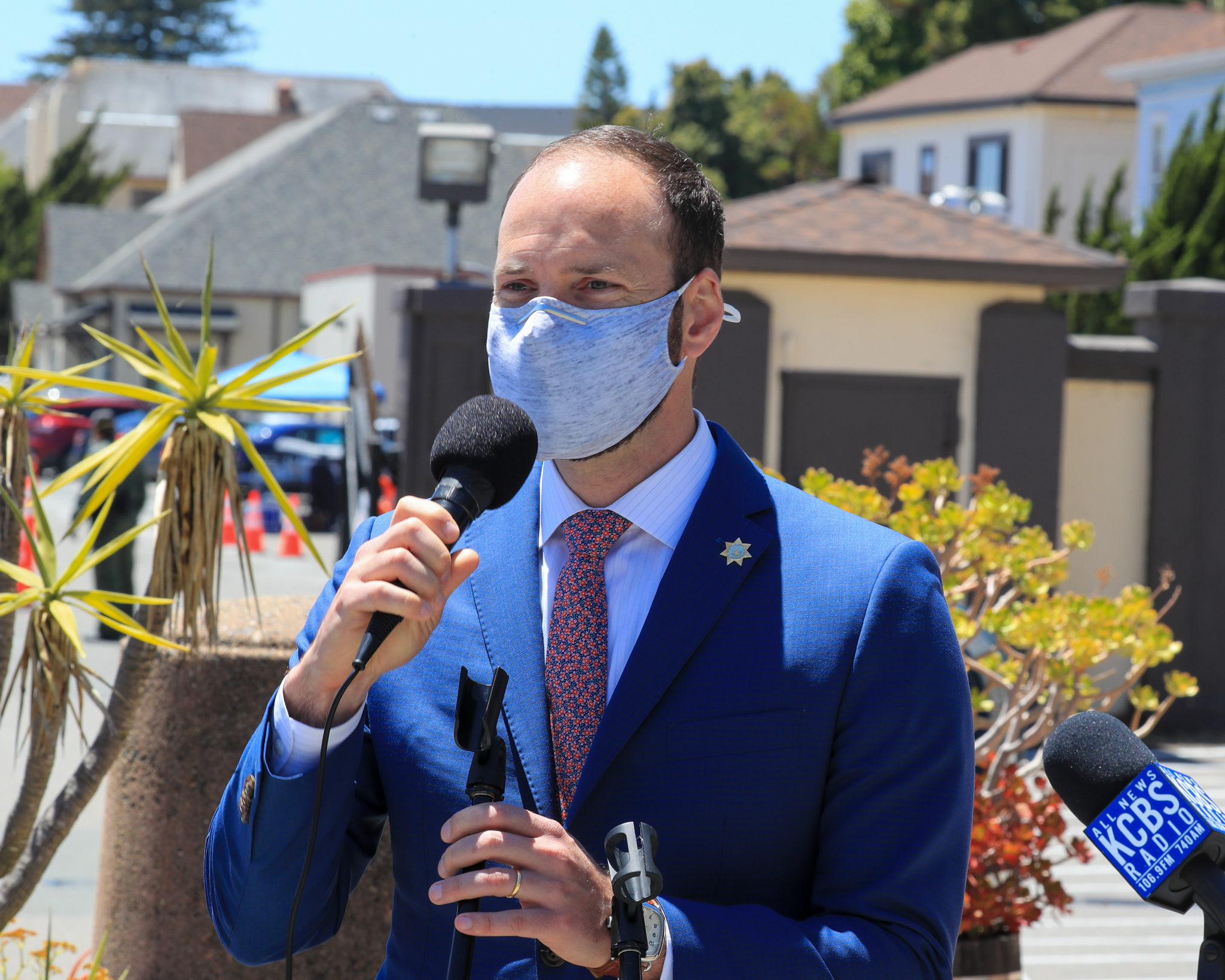

With COVID cases at San Quentin soaring from none to over 1400 in just under a month, five Bay Area Legislators flanked by prison advocates and criminal justice leaders urged Governor Newsom to reduce the population at San Quentin and other prisons in response to a public health crisis.
Adnan Khan, Executive Director of Re:Store Justice and himself formerly incarcerated for life at San Quentin before being released under felony murder reform, hosted the press conference.

“Spending 16 years, I know that there aren’t people who are irredeemable, who are monsters that society has thrown away,” he said. “There are people who have never been loved, yet they still give love. There are people back there that care, that love, that are making amends back there in the midst of that pandemic. Still thinking about their families. Still thinking about the victims who they harmed. They are not our enemies.”

A woman known as “Mama Bear” spoke, her son tested positive. “My son’s life is important, he’s important to his sons, he’s important to me,” she said. She wanted them to be fed properly and have their health care needs addressed. “They’re dying in there.” She added, “Free my baby, I can take care of him.
“This is not about they did a crime—they’re humans,” she said.

James King from the Ella Baker Center and a formerly incarcerated community leader, read a letter from a person at San Quentin, who noted the conditions of the prison.
“I count at least five alarms a day,” he read. “Over 30 people hospitalized in my building alone this past week.” He described his physical pain and discomfort along with the box lunch served three times a day as the only remedy that the authorities have given him.
They have had no calls in two weeks, a shower once every five days. “Showering with 40 to 50 other people at a time,” he said. Eighteen shower heads. One foot apart. In a building with no ventilation. He described, as they put the healthy with the sick and packed them in. Two days after this, “I was showing symptoms.
“I was locked in my cell 23 hours a day,” he read. “I slept head to foot with my cellie—still infected with COVID-19.”
He received his testing—negative for COVID-19. Was then transferred. The reality, he said, “this is the sickest I’ve been in my life. This is the most alone I’ve ever been in my life.”
He concluded, “Please Gavin Newsom, save our lives, we are dying in here.”
King added his own voice asking Gavin Newsom to visit, and noting that the account “doesn’t do justice—he is still downplaying what they are going through in there.”

Assemblymember Marc Levine represents the area with San Quentin and lives a few minutes away. He noted that he felt that he felt his first call in April for a plan to deal with COVID came too late, but “it’s unfortunate that they didn’t listen to that call.”
He said, “We’ve seen what has happened since then. Nothing less than the worst prison health screw up in state history.” He described how five people at CDCR “led the transfer of COVID-19 positive prisoners to San Quentin. Lighting off a spark that has set San Quentin state prison on fire and that fire has not been put out yet.
“There must be accountability,” he said. “People have lost their lives because of these decisions by people who still have their jobs.”

Senator Scott Wiener called this “a humanitarian disaster that is compounding another humanitarian disaster called mass incarceration.”
He said what’s happening at San Quentin is not just because of COVID-19, but also “because the state of California for the last 40 years now is absolutely addicted to incarcerating more and more people for longer and longer sentences. And it doesn’t have to be that way.”

Assemblymember Ash Kalra said that, while there is a pandemic, “there is a backdrop of a deadly disease called mass incarceration. We have to deal with that disease.”
He said, “What COVID-19 is doing is not creating this trauma, it’s exposing it. It’s exposing the trauma that has been there for decades.” He added, “When we think about where we are today, we have to recognize it’s taken decades to get here.”
He explained that he was a deputy public defender in Santa Clara County for over a decade and “I saw first hand what we were doing when we were building the mass incarceration capital of the world.”
Assemblymember Kalra said that seven have now died at San Quentin.
“We know this is a bad policy,” he said. “We must come together and let them out.”

Assemblymember Phil Ting said that he is “so sick and tired of how much we spend on our prison system,” which he said is almost as much as we spend on all our universities and community colleges combined.
“If that doesn’t make you sick, I don’t know what does,” he said.
The assemblymember noted that they are having a debate right now over how quickly to parole people after they have aged in prison. “Even though they are older,” he said. “Even though they haven’t demonstrated any danger to society in decades. We don’t have policy in public safety based on data—it’s based on fear.
“People were sentenced for certain things they committed, but they weren’t sentenced for COVID,” he said. “We knew if COVID got to any one of these facilities… that once you get COVID, you can’t shelter in place.
“There’s no way not to have COVID spread like wildfire. It’s putting up a stack of kindling and lighting a match. That’s what it’s like inside.”

Assemblymember Rob Bonta said, “We are in the middle of a humanitarian crisis.” He called it “an unforced error” that was “wholly avoidable” and “based on acts of commission by the state of California.”
He said, “We missed that opportunity to use that ounce of prevention and now we must use a pound of cure to make things right.”
Assemblymember Bonta noted that last year he proudly stood with Governor Newsom when he put a moratorium on the death penalty, “but now death has returned to San Quentin in the form of COVID-19.
“We should be judged by how we treat our most vulnerable in California,” he said, and that includes our incarcerated population. “We hold a special responsibility to do it right. We imposed a great loss on this population.”
He said, “Public health officials have said, and this is a governor who properly follows data and science and public health guides, public health experts have said, reduce the population of San Quentin by 50 percent.”

San Francisco Public Defender Mano Raju also addressed the media.
“There’s a lot of people back there behind that gate getting sick,” he said. “But what’s equally sick is that we as a society and too many people in power have decided that the only way to measure justice is by the number of days that we put someone in a cage. That’s wrong and it needs to stop.”
He said, “The vast vast majority can be released and there will be no decrease in public safety at all.” Raju added, “We are in a human rights emergency right now.”

Alameda County Public Defender Brendon Woods said that he may be repetitive in his comments, but “I’m going to keep fighting, keep arguing, keep advocating until someone in Sacramento listens.”
Woods said that last week he sent Governor Newsom a petition with 10,780 signatures, asking him to take action and release people in prison due to COVID.
On Thursday, he said when he wrote that petition there was one case at San Quentin, now there are over 1300 active cases in San Quentin.
“That letter has three demands,” he explained. “One, release everyone who has a year or less to serve—release them immediately, release them now. That has the potential to release about 30,000 people in custody.
“Two, release everyone over the age of 60,” he said. “We know right now there are over 5000 people in custody over the age of 65.”
Third, he said, early release. “There are over 6000 people right now who by their own standards are considered low risk. Release them now.”
He said, “We have to begin to release people now. You have to reduce the prison population by 50 percent or no one will be safe.”

Finally, SF District Attorney Chesa Boudin said, “I feel outnumbered by the public defenders and that’s not a good thing.” He said that’s not because he doesn’t love and respect them, but “because we need more district attorneys in this fight.
“We are here because the US leads the world in locking people up,” he said. “It’s not making us safe and it didn’t take COVID-19 to teach us that.”
He said there are things we can do and that, thanks to the leadership of the legislature, “we actually have tools and we have data.
“We have seen in San Francisco in just six months what we can do when we fight for decarceration,” he said, noting that San Francisco has cut its jail population in a matter of months by over 40 percent.
“That’s not enough—we’re just getting started,” he said. “Crime rates are going down.”
He said that he talked to a guy this morning released two months ago, “because my office used our power, used the tools that the state legislature gave us to bring him home under felony murder reform.”
Chesa Boudin said they can resentence anyone under 1170(d). His office in just six months has used it a dozen times.
“It’s not enough,” he said. “But it’s more than the other district attorneys in this state combined.”
—David M. Greenwald reporting
To sign up for our new newsletter – Everyday Injustice – https://tinyurl.com/yyultcf9


The governor just announced that 8000 people will be released. It appears the first wave is people who have less than a year left on their sentence…